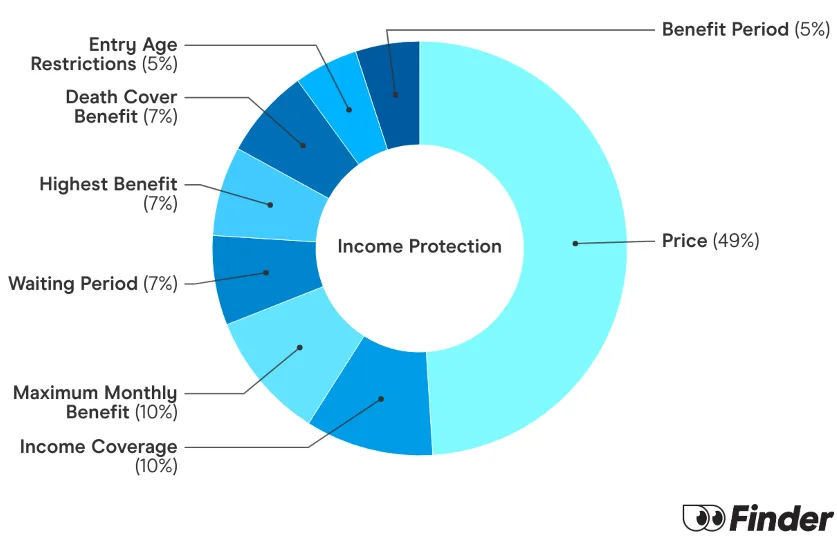AIA Income Protection Review

We currently don't have this product on Finder
- Maximum % of income Covered
- 70%
- Maximum Monthly Benefit
- $30,000
- Maximum Entry Age
- 59
- Maximum Benefit Period
- age 70
Our verdict
AIA income protection is good at offering different options to suit varying budgets, but it can only be purchased through super or a financial advisor.
- AIA is good at offering a few different income insurance options. You can get cover through super or an advisor — you can even get accident only cover and income protection core, a more affordable option that pays you a monthly benefit if you become disabled.
- Income protection purchased through a superannuation fund has a higher than average claims acceptance rate — the average is 95.1%.
- Policies purchased through a financial advisor have a 91% claims acceptance rate, the second-lowest of 11 brands tracked on MoneySmart, the Australian government's consumer site.
Details
Eligibility
| Minimum entry age | 15 |
| Maximum Entry Age | 59 |
| Expiry Age | 70 |
| Minimum Hours Eligibility | 20 |
Get income protection with AIA through an adviser
Read a more detailed review on:
![]()
Income protection insurance
Key points of AIA income protection insurance
AIA offers income Protection CORE cover which lets you choose a:
- Monthly Benefit. How much of your salary you want to insure (up 70% of your income - max. $30,000 per month) to help cover ongoing essential costs if you get sick or injured and can't work.
- Benefit Period. The maximum period you'll receive payments for – 2 years, 5 years or up to age 65.
- Waiting Period. The amount of time you're willing to wait between a claimable event and your first income insurance benefit payment – 30 days, 60 days, 90 days or 2 years.
Note: Be sure to check the Product Disclosure Statement (PDS) for terms and conditions.
![]()
Optional add ons
Key optional add-ons of AIA income protection:
When you take out an AIA income protection policy, you also have the option to add on the following:
- Claim escalation. This allows you to have your claim payments increased each year while continuously on claim, in line with the Consumer Price Index (CPI). It's designed to help out if you're on claim long-term.
- Retirement protector. You have have a monthly benefit paid to a nominated Superannuation Fund in addition to Total or Partial Disablement Benefits paid under your Income Protection CORE cover.
![]()
Eligibility
Applying for AIA cover:
- For most occupations, you'll need to be between 15 and 59 years old to be eligible for cover.
- You must be an Australian citizen or permanent resident, or a New Zealand citizen.
- Be a Commonwealth Bank customer who is registered with NetBank.
- Be employed and work a minimum of 20 hours per week (excludes heavy manual occupations).
- You'll also need to meet the health/lifestyle requirements from the underwriter during the application process to start receiving cover.
AIA income protection insurance pros and cons
Still wondering if AIA is right for you? Here are the main pros and cons summarised:
Pros
- Policies through super have a high claims acceptance rate
- It gives you access to AIA vitality.
- It's good if you want to go through an advisor
Cons
- It's not good if you don't want to go through an advisor.
- Policies bought through an advisor have a lower than average claims acceptance rate.
How do I make an AIA income protection insurance claim?
If you need to make a claim on your AIA income protection insurance policy, you can call them on 1800 333 613 between 8am and 6pm (AEST) Monday to Friday. Alternatively, you can contact your financial adviser directly.
What are some of the key benefits of AIA income protection insurance?
- Total or partial disablement. This gives you monthly benefit payment up to a maximum of $30,000 per month (70% of your income) prior to your claim. This lowers to a maximum of 60% after 24 months on claim.
- Benefit indexation. Your sum insured can automatically be increased each year (based on the Consumer Price Index).
- Waiver of premium. Your premiums will be waived while you are on claim.
- Involuntary unemployment waiver of premium. Waives your premiums for up to three months if you become involuntarily unemployed (only accessible once in a 12-month period).
- Salary increase benefit. This lets you increase your monthly benefit by 15% up to a maximum of $2,500 when your salary increases, without having to provide further medical or insurability evidence.
- Rehab expenses. Covers the costs of a pre-approved rehabilitation program (up to a maximum of 12 times your monthly benefit).
- Interim accidental income protection cover. Get up to $10,000 outside superannuation for up to six months if you become Totally Disabled due to an accidental injury while AIA are assessing your application.
- Needlestick injury (only for certain occupations). This pays a benefit if your earnings are reduced due to you being accidentally infected with HIV, AIDS or Hepatitis B or C because of a needlestick or splash injury while performing your job.
Compare more income protection policies below
Compare other products
We currently don't have that product, but here are others to consider:
How we picked theseFinder Score - Income Protection
Income Protection is a little complicated and a lot overwhelming. That's why we made the Finder Score, to make it easier to compare Life Insurance products against each other. Our experts analysed over 12 products and gave each one a score rank out of 10.
But a higher score doesn't always mean a product is better for you. Your situation is unique, so your policy choice will be too. Don't think of Finder Score as the final word, but as a good place to start your life insurance comparison.

